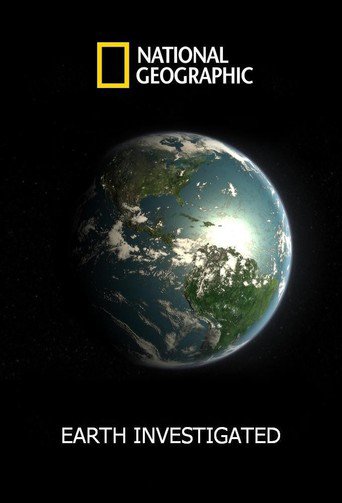With 30 Day Free Trial!
Earth Investigated
2005Watch Trailer
With 30 Day Free Trial!
Earth Investigated Season 2008 Full Episode Guide
It's widely believed that the awesome Aztec civilization was wiped out during the 1500s by diseases introduced by Spanish Conquistadores. Eighty percent of that Central Mexican population died in the devestating epidemics that followed their arrival. Research by a pair of scientists, however, suggests that their fate was not a result of visitors from the New World. If their conclusions are correct, the same ting that killed the Aztecs could happen again in this century.
This episode concentrates on how the universe was made in the Big Bang and how scientists predict it could end similarly as it continues to expand. Several theories are covered including the "Big Crunch" where the universe shrinks back to its original size, and the "Big Chill" with the universe slowly freezing to death.
It looks like Superman's fortress. Hidden deep beneath the surface of the Earth is one of the greatest natural marvels on the planet: a giant crystal cave with crystals up to 36 feet long and weighing 55 tons. But this scorching cavern could kill humans after just 15 minutes of exposure. Follow an international team of scientists as they don high-tech protective gear to safely unlock the secrets of the crystal cave. They'll attempt to answer the questions, What are the crystals made of? How did they reach such superheroic proportions? And is there life here?
Few scientists like to predict the future. But geographer Chris Scotese has drawn a map of Earth 250 million years from now. This supercontinent is a place of wild extremes. In this one hour program scientists such as climatologist Dr Paul Valdes, atmospheric scientist George Bryan and paleobiologist Bruce Tiffney predict what life might be like on a future Earth. But other scientists believe a future single landmass world could sow the seeds of destruction for all life on Earth and the formation of a scorched and barren planet in its place.
It's perhaps the most renowned telescope in the world; responsible for unlocking many mysteries of the final frontier; and now it is in danger of being lost forever. The Hubble Space Telescope has explored the creation of stars and planets, the glory of supernovas and the formation of super massive black holes, charted dark matter and changed forever our understanding of reality itself. Now, it's spiraling toward the Earth, and astronauts are embarking on a dangerous mission to fix it. In Hubble's Amazing Universe, we'll glimpse the far ends of the universe as seen through the amazing Hubble Space Telescope, and meet one of the astronauts risking everything to save it.
13.7 Billion years ago, there was absolutely nothing. No space, no time, and no matter. Then there was the Big Bang. Naked Science follows the first second of creation, when a minute speck of light appeared from nothing, expanded at unimaginable speed, and created everything we see in the Universe today.
Since the formation of the planet, Earth's magnetic field has shifted poles thousands of times. The last time it happened, humans weren't around. Now with the field weakening, scientists believe another flip is near. Soon, several satellites will be launched with magnetometers to detect even subtle changes, helping experts predict when the field may reverse.
The idea of traveling through time has long been a fanciful dream of scientists and fiction writers. Since determining that we live on a space-time continuium that can be warped by gravity, thinkers have pondered how to make that happen. Now scientists are wondering if lasers would allow us to twist the fabric and make possible leaps forward and backward in time.
This is the story of mankind's first major ocean crossing the groundbreaking first arrival in Australia. It holds the secrets as to how and why modern humans were able to dominate this planet and beyond. In this one hour film experts explore the mysteries that surround this historic journey - how and when it was achieved, was it a purposeful mission or simply an accident and exactly what it is different about modern humans that give us the capabilities to go where no man has gone before
Cosmic debris is an ever present threat to humanity, but what are we doing to protect ourselves? Here we look at new research to determine exactly what the threat is and what we are doing to safeguard our future in the face of the dangers from space. Most of the huge 'dinosaur killing' asteroids have been identified and tracked but the possibility of them impacting is extremely rare. The newly identified danger is the much more numerous and smaller asteroids.
NASA's Cassini spacecraft, launched in 1977, used the gravitational pull of Venus to act as a sling shot to travel the 2 billion miles to Saturn. Its arrival in 2004 allowed an unprecedented study of the planet's mystical rings and details of what lies below Saturn's seemingly smooth exterior. What has been learned so far (the probe continues to orbit and study) is analyzed, as well as information gleaned from the Huygens probe which landed on its moon Titan.
After blasing off from Earth on 8/4/2007, NASA's Phoenix Lander is scheduled to enter Mars' atmosphere on 5/25/2008 and land on the polar ice-cap. If all goes well, the solar powered robot will extend its nearly eight foot scoop and dig into the ice amd soil, seaching for the building blocks of life: carbon, nitrogen and, most importantly, water. Phoenix's goal is to prove that life either was, or perhaps is, posssible on the red planet. If it succeeds, it will change our understanding of life in the universe and its uniqueness to our planet.
Three million miles from earth lies a planet so small that even the most advanced telescopes. A dedicated core of scientists offer educated guesses as to the makeup and condition of Pluto, as well as discuss its qualifications to be counted as a planet. Meahwhile, the New Horizons space probe continues its nine year trek to the planet to finally reveal the secrets of the "planet".
How did life begin? its one of the most fundamental and difficult questions that has challenged us for ages. Our planet is teaming with life, from the highest mountain to the deepest ocean; life is everywhere. But what was the firing pistol that started the evolutionary race? How did material go from non-living to alive?
The shape of the North American continent has changed radically over millions of years. During the great Ice Age, glaciers carved out the Great Lakes; as the Earth's temperature rose, they filled with glacier melt. The Great Salt Lake is just a shadow of its former self. And as tectonic plates continue to move, America moves closer to Europe each year.
Did the American Rockies rise faster than their Canadian counterpart? New evidence from fossilized leaves and pollen suggest just that. Explore the mysteries of these ancient mountains.
The Grand Canyon is a natural wonder so large it can be seen from space. Examining the layers of rock exposed from centuries of of erosion, geologists trace the canyon back to its early days when the Colorado River first began to flow through the region.
Free Trial Channels
Seasons
























